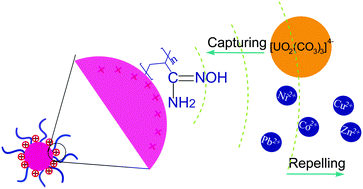Zeta potential-assisted sorption of uranyl tricarbonate complex from aqueous solution by polyamidoxime-functionalized colloidal particles†
Abstract
Uranium(VI) is one of the main sources in nuclear energy but can cause severe effects to human health and the environment, therefore it is important to develop a new method and materials for uranium capture. A novel approach is reported here for efficient uranium sorption by polyamidoxime-functionalized colloids with zeta potential-assistance. Specifically, colloidal particles were prepared via emulsion polymerization with (3-acrylamidopropyl)trimethyl-ammonium chloride (MAPTAC). The zeta potential of the colloids could be controlled by the concentration of MAPTAC. The effects of pH, the sorbent dose and competing ions on uranium(VI) sorption were investigated. The sorption process followed a pseudo-second-order kinetics and could reach equilibrium within 3.5 h at pH 7.8. The colloidal particles with high zeta potentials showed higher selectivity, faster kinetics and larger capacity for the sorption of uranium(VI) in comparison with that of negative zeta potential particles. This work may provide a new method for efficient uranium(VI) capture from aqueous solution through zeta potential-assisted sorption.


 Please wait while we load your content...
Please wait while we load your content...